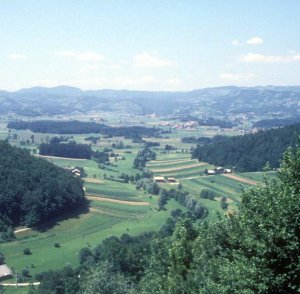|
SOUTH-EASTERN SLOVENIA IN THE EARLY IRON AGE.
Settlement – Economy – Society
Contents

- 1. History of research
- 1.1. From the beginnings to the end of the 19th century
- 1.2. Twentieth century
- 2. Data acquisition
- 2.1. Delimitation of the research area
- 2.2. Catalogue of sites
- 2.2.1. Basic register of sites – Arheološka najdišča Slovenije
- 2.2.2. Archival records
- 2.2.3. Field surveying
- 2.2.4. Trial trenches
- 2.3. Publications
- 3. Evaluation of sources
- 3.1. Data acquisition and frequency
- 3.2. Structure of the site database
- 3.3. Chronological determinability of sites
- 3.4. Range of the site database
- 4. Geographic outline
- 4.1. Landscape features and regional division
- 4.2. Geology
- 4.2.1. Formation and rock composition
- 4.2.2. Tectonic composition
- 4.2.3. Mineral raw material
- 4.3. Relief
- 4.4. Hidrography and water sources
- 4.4.1. Main watercourses
- 4.4.2. Water supply and use of water sources
- 4.5. Climate
- 4.6. Soil and vegetation cover
- 4.7. Applicability of the data on the present-day environment in prehistoric studies
- 5. Chronology
- 5.1. Short history of the chronological system
- 5.2. Terminology
- 6. Settlement structures
- 6.1. Fortified settlements
- 6.1.1 Chronological determination
- 6.1.2. Location
- 6.1.3. Typology of fortified settlements
- 6.1.4. Fortification structures
- 6.1.4.1. Constructions of earth and wood
- 6.1.4.2. Constructions of stone
- 6.1.5. Entrances
- 6.1.6. Interior layout of settlements
- 6.1.6.1. Buildings
- 6.1.6.2. House construction
- 6.2. Unfortified settlements
- 6.2.1. Chronological determination
- 6.2.2. Location
- 6.2.3. Some data on the unfortified settlements
- 6.3. Cemeteries
- 6.3.1. Tumulus cemeteries
- 6.3.2. Flat cemeteries
- 6.3.3. Flat and tumulus cemeteries
- 6.4. Hoards
- 7. Settlement dynamics
- 7.1. Settlement in the Late Bronze Age
- 7.1.1. Settlement pattern
- 7.1.2. Settlement characteristics
- 7.1.3. Relationship between the upland and lowland settlement
- 7.2.Settlement in the Early Iron Age
- 7.2.1. Integration process and emergence of centres
- 7.2.2. Settlement pattern in the Early Hallstatt period
- 7.2.3. Settlement pattern in the Late Hallstatt period
- 7.2.4. Settlement outside the hillforts
- 7.3. Settlement in the Late Iron Age
- 7.3.1. Settlement pattern
- 8. Hierarchy of settlements
- 8.1. Criteria for settlement classification
- 8.2. Identification and presentation of significant settlements
- 8.3. Hierarchy of the centres
- 9. Settlements and their economic background
- 9.1. Density of the settlement network
- 9.1.1. Site catchment analysis
- 9.1.2. Conflict zones
- 9.1.3. Relationship between centres and peripheral settlements
- 9.2. Natural sources
- 9.2.1. Soil quality and agricultural background
- 9.2.2. Food supply and consumption
- 9.2.2.1. Land cultivation
- 9.2.2.2. Stock breeding
- 9.2.2.3. Hunting and fishing
- 9.2.3. Metal ore deposits
- 9.3. Communication and transport
- 9.3.1. River ways
- 9.3.2. Landways
- 9.3.3. Territorial and communication control
- 9.3.4. Traffic and exchange
- 10. Social structure
- 10.1. Structure of cemeteries
- 10.2. Structure of burials
- 10.3. Warriors
- 10.4. Women and children
- 10.5. Social organization
- 10.6. Social and historical turning points
- 11. Catalogue of sites
- 12. Bibliograpy
- 13. Indices
- 13.1. List of places
- 13.2. List of sites
***
2007, (Opera Instituti Archaeologici Sloveniae, 12), 392 pp., 4 colour drawings and maps, 275 b-w drawings, photos, tables, graphs and maps, 20 x 29 cm, hardcover, ISBN 978-961-254-000-5.
Opera 12 Top
|
 Institute of Archaeology
Institute of Archaeology